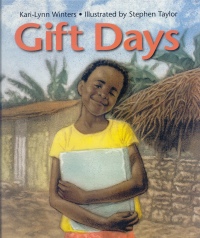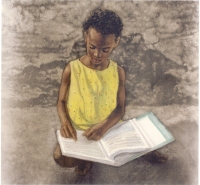| ________________
CM . . .
. Volume XIX Number 24. . . .February 22, 2013
excerpt:
This dedication [above], by author Kari-Lynn Winters, sets the tone for a story of a Ugandan girl’s struggle to get an education.
Brother Matovu, recognizing Nassalli’s desire to read, starts to help with the chores one day a week and to teach Nassali what he has learned – the “gift days” of the title. An epilogic last page shows Nassali at a desk, having been accepted as a student at Makarere University, writing a letter of thanks to her brother. Two pages of end matter describe the lack of access to education in Africa due to cultural barriers, poverty and disease. This situation applies to many children, but especially to girls. There is also information about the section of the United Nations Declaration of the Rights of the Child applying to education. The author teaches children’s literature at Brock University and has written a number of other picture books (Runaway Alphabet, On My Walk). Her straightforward narrative, using a select number of Lugandan words, offers a window into the contemporary rural culture of Uganda (including the Nassali’s child-like reference to “the [clearly fair-skinned] researchers…who came from far away and always wrote on the whitest paper”). Stephen Taylor, a seasoned book illustrator (One More Border, Music From the Sky) places solid human figures in colourful modern dress against a sepia background. The poses are generally sympathetic, although a few are rather stiff, and middle younger sister’s head never sits quite right on her body. For the subject matter alone, this book belongs in all primary school and public library collections. Recommended. Ellen Heaney is the Head of Children’s Services at the New Westminster Public Library in New Westminster, BC.
To comment
on this title or this review, send mail to cm@umanitoba.ca.
Copyright © the Manitoba Library Association. Reproduction for personal
use is permitted only if this copyright notice is maintained. Any
other reproduction is prohibited without permission.
NEXT REVIEW |
TABLE OF CONTENTS FOR THIS ISSUE
- February 22, 2013.
AUTHORS |
TITLES |
MEDIA REVIEWS |
PROFILES |
BACK ISSUES |
SEARCH |
CMARCHIVE |
HOME |

 Nassali longs for a chance to go to school, but because her mother has died and there are four other children in the family, she, as the eldest girl, is burdened with household chores. She watches the only boy in the family go off to class, and she plays teacher to her younger sisters, but when she voices her desire to learn, too, she is told that her cooking and cleaning tasks come first. Then follows the refrain “This is the way it’s always been”. After hearing this again from several relatives:
Nassali longs for a chance to go to school, but because her mother has died and there are four other children in the family, she, as the eldest girl, is burdened with household chores. She watches the only boy in the family go off to class, and she plays teacher to her younger sisters, but when she voices her desire to learn, too, she is told that her cooking and cleaning tasks come first. Then follows the refrain “This is the way it’s always been”. After hearing this again from several relatives: